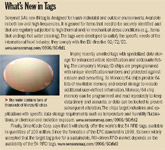It's clear that developers see RFID-and-sensor networks as a key growth area. A sampling of recent developments in tags (sidebar) and infrastructure prove it.
 What s New in Tags |
For instance, Sun Microsystems says it combined its RFID Test Center with its Advanced Product Testing (APT) environmental test laboratory to meet growing demands of customers to test multivendor RFID and sensor products for their ability to withstand extreme conditions such as excessive heat and cold, shock, humidity, vibration, altitude, and pressure. Sun says the new facility, called the Sun Advanced Product Testing Lab for RFID and Sensors, is the world's first to combine industrial-strength environmental-stress testing with comprehensive interoperability and standards-compliance testing.
 |
The RFID Test Center helped customers implement comprehensive, interoperable RFID systems that meet industry standards and mandates, says Jim Del Rossi, facility director. Combining it with the APT lab lets customers conduct real-world, industrial-strength tests relevant for military, shipping, aerospace, medical, and other settings. www.sensorsmag.com/0906/SCrfid4
Additionally, Sun recently launched the first RFID and sensor-based Java.Net community Web site for Java developers at http://sun.java.net/rfid-sensors. The site gives access to a community of expert colleagues; information and product demos; free RFID software, toolkits, and sample source; and other resources for creating RFID and sensor-based products, applications, and services. www.sensorsmag.com/0906/SCrfid5
AT&T Inc. and its subsidiary, Sterling Commerce, are partnering with Intel, BEA Systems, and Symbol Technologies to design and deploy RFID device services and networks. They wish to offer businesses a best-of-breed managed RFID service and to standardize RFID technology by accelerating mass adoption through the evolution to universal sensor networks.
The partners are working to incorporate end-to-end services for RFID networks across diverse hardware platforms, operating systems, applications, and databases. This is a major challenge confronting RFID technology today.
"As RFID becomes more widely deployed, network reliability, security, and data integrity become increasingly critical," says Eric Shepcaro, senior vice president of business development at AT&T. "And for most companies, the task of ensuring those three things will be overwhelming and complex, especially across multiple hardware platforms and configurations and diverse supplier and partner networks and databases."
AT&T says RFID represents its initial offering in universal sensor networks. The company is collaborating with industry leaders to develop location-based services, wired and wireless tracking, and specialized network applications. www.sensorsmag.com/0906/SCrfid6
G2 Microsystems Inc. has developed a device provider for Microsoft BizTalk RFID. It enables ultra-low-power devices to sense and report data through a WiFi access point to Microsoft BizTalk RFID—thus leveraging ubiquitous WiFi and Windows technologies.
G2's ultra-low-power system on a chip (SoC) integrates WiFi with RFID technology and sensors, allowing battery-backed devices to sense and report for up to five years with no incremental infrastructure cost. Microsoft BizTalk RFID provides device abstraction, data filtering, and event handling while allowing G2-based tags to transmit sensor data through the widely deployed WiFi (IEEE 802.11) network infrastructure to the BizTalk RFID. www.sensorsmag.com/0906/SCrfid7
